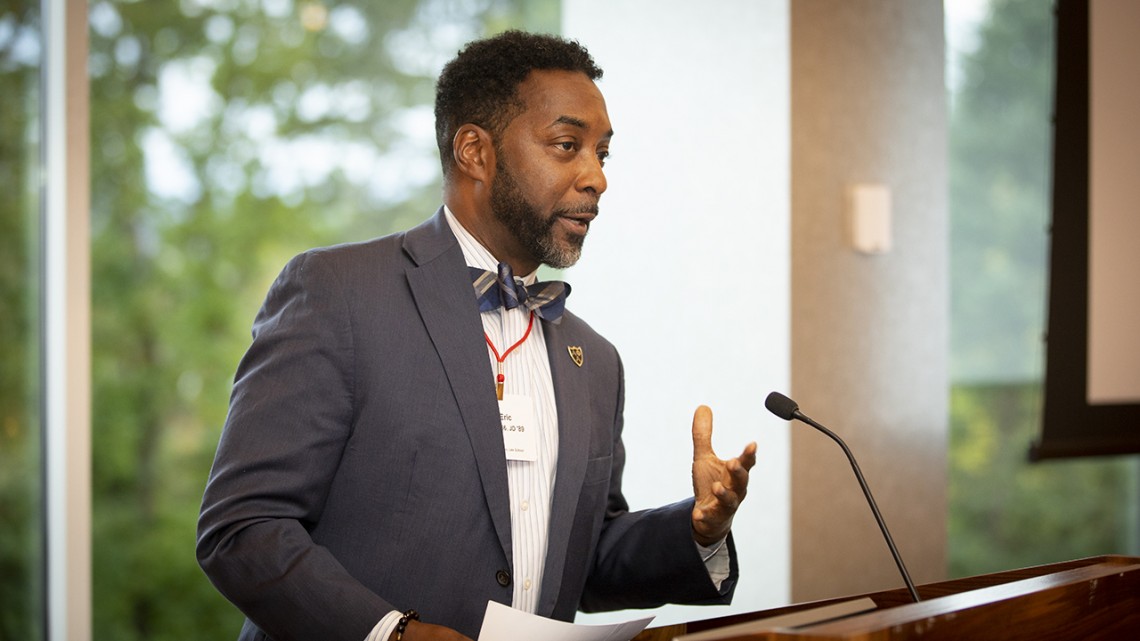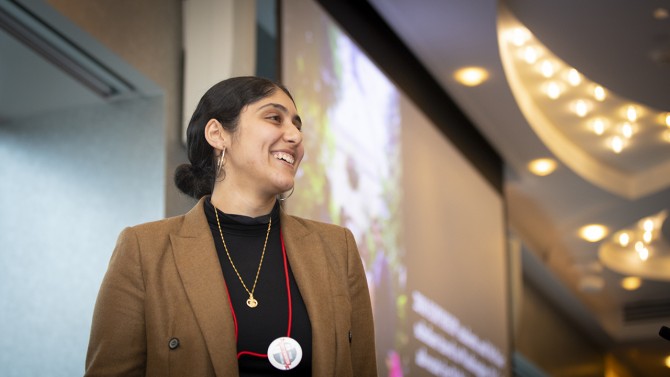
E. Eric Elmore ’86, J.D. ’89, recounts his Cornell experiences for attendees at the EOP-HEOP 50th anniversary dinner.
Students, alumni celebrate 50 years of opportunity programs
By Daniel Aloi
Alumni of New York state’s Arthur O. Eve Opportunity Programs at Cornell gathered with the programs’ current students and administrators at a reception and dinner Oct. 4 in the Statler Ballroom.
The event marked 52 years of the Educational Opportunity Program (EOP) and the 50th anniversary of the Higher Education Opportunity Program (HEOP), which provide access to education for students across the state.
“We are a family, and that’s what we talk about with our students. … You all are siblings in one way or another, connected through these programs,” said William “Woodg” Horning, M.P.S. ’10, director of student opportunity programs and senior associate director of the Office of Academic Diversity Initiatives (OADI).
“I can honestly say I don’t know where I would be without HEOP,” said biology and society major Diala Haddad ’20. “When I first got accepted, I was honestly really shocked because my guidance counselors back home told me I couldn’t do it. I’m really glad I didn’t allow that self-doubt and the external doubt to stop me from coming here, because HEOP has genuinely changed the trajectory of my family’s life and my life, forever, so I’m eternally grateful for that.
“They give you so much support in your successes, but also in your failures,” she said. “And I think they’ve just been my biggest support system.”
Haddad is an EOP/HEOP student ambassador, a program Horning said OADI began four years ago for peer leaders to guide and help other students.
“A lot of times, as students of color and as low-income students we tend to look around, and sometimes it’s like, ‘Oh, this person has a whole legacy, their whole family went here. Do I really belong here?’” she said. “Well, we also have a legacy. Our legacy is right here in this room. We’re here because of all the people that walked before us. We are an investment … they see our potential even when we don’t see it ourselves. So just remember that – look forward to what you can be.”
Alumni keynote speaker E. Eric Elmore ’86, J.D. ’89, an attorney for the Federal Trade Commission, recounted his experiences as a first-generation student from a poor neighborhood in New York City.
“I saw myself as wanting to walk in the footsteps of my hero, my idol, Thurgood Marshall,” he said. “I wanted to go to college.”
He applied to Cornell and was accepted; after coming to campus for the COSEP (Committee on Special Educational Projects) summer program, he decided to take classes in the College of Arts and Sciences.
“I remember often going into the HEOP/EOP/COSEP office, where they talked about the many resources that we have, like old exams to help you prepare for upcoming prelims and finals,” he said. “They also had tutors available for the more rigorous courses you had to take, and counselors you could talk to so that you can see that you were not alone and you can make it at Cornell.”
The dinner featured a video about the opportunity programs’ history at Cornell, with testimonials about EOP and HEOP from students and alumni, and congratulatory messages from President Martha E. Pollack and Lisa Nishii, vice provost for undergraduate education.
Horning invited students and alumni to share their own stories, for similar tributes to the opportunity programs throughout the academic year. He also urged them to advocate for the programs: “Contact your legislators – if this is a program that meant something to you and gave you a place, let them know that it’s important to keep these things alive.”
Arthur O. Eve, a Buffalo-area Assemblyman from 1966 to 2002, led efforts in the New York State Legislature to obtain funding to establish EOP in 1967 and HEOP in 1969. Both programs assist students who have not seen their true potential come to fruition due to educational or financial constraints.
EOP, funded in part by the State University of New York (SUNY), is available to eligible students applying to Cornell’s SUNY-affiliated contract colleges. HEOP, offered by the state in partnership with independent colleges, is funded in part by the state Department of Education. The programs provide for academic, career and professional support for students, as well as financial support and assistance.
“I see a 50-year partnership that has allowed all of us to talk about access and success in a much more expansive way,” said Wayne Hilson, OADI’s new executive director. The state programs have “provided access not only to higher education in general and Cornell specifically, but for nearly two generations of students, something much more profound – access to an expanded sense of self and what is possible in one’s life.”
Media Contact
Get Cornell news delivered right to your inbox.
Subscribe

